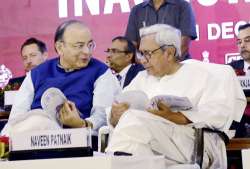Finance Minister Arun Jaitley on Thursday said the hardships faced by people after demonetisation of high-value currency notes will remain for one or two quarters but its effect on the economy will be seen in long term.
"The effect of demonetisation would remain for one or two quarters but its effect on economy would be seen in long term," Jaitley told reporters on the sidelines of the 'Made in Odisha' Conclave here.
He thanked Odisha Chief Minister Naveen Patnaik for backing the government on demonetisation and the Goods and Services Tax (GST).
The Finance minister termed as "game changers" the pulling out of Rs 500 and Rs 1000 notes as well as Goods and Services Tax, which is proposed to be rolled out from April 1.
"I do believe that both (GST and demonetisation) will be game changers. This is because GST will ensure higher taxation as far as the Centre is concerned and also higher taxation for states. It is an efficient system. It blocks leakages. It will certainly help the consuming states like Odisha," he said while speaking at the conclave.
On the hue and cry over the demonetisation exercise, he said: "As far as currency changes are concerned, once the demonetisation process is completed and the economy gets back to full stream, the size of the GDP will significantly expand, tax base will expand."
"More money will come to the banks which will be used more fruitfully for the benefit of the economy and together these two things have the potential to exaggerate what the Centre and the state are doing,” he added.
The Finance minister said that though the initiatives by the central government might appear challenging, its long-term impact will be beneficial for the economy.
The informal economy will take the shape of a formal one and the state would get more revenue since there would be no leakage, the minister pointed out referring to the impact of GST.
"This will boost trade and commerce which in turn will help people at large," he said.
He spoke of states like Odisha that are in line for better infrastructure, health and education through much higher allocations, adding that the chief minister's initiative to transform the state as a manufacturing hub could be better realised through the reforms of the central government.
The Centre will fully support the state in its 'Make In Odisha' campaign, Jaitley promised.
Hailing the high growth rate of Odisha this year, Jaitley said: "If Odisha's GDP grows faster than the national GDP, then it will also help in improving the GDP of the country."
Jaitley said: "The state has both challenges and assets. While poverty and huge tribal population are a challenge for the state, Odisha is rich in mineral resources, besides a long coastline."
He said the Odisha government will have complete support of the central government for its Make in Odisha campaign.
He noted that the state government has been able to reduce poverty to a large extent.
"Odisha, a state which conventionally had a very high percentage of people below poverty line, is now trying to improve upon its growth rate. And its growth rate in recent times have significantly improved. Poverty level has come down," he said.
Odisha registered a GDP of 9.2 per cent, two per cent higher than the national GDP.
And one of the great challenges is its growth rate must continue to expand," Jaitley added.
"As far as percentage of manufacturing as part of the GDP is concerned, in Odisha, it is higher."
Jaitley also drew attention to the combination of manufacturing and stress on agriculture that could pay dividends. He unveiled Odisha government's master plan on port-based manufacturing hub.
Latest Business News

